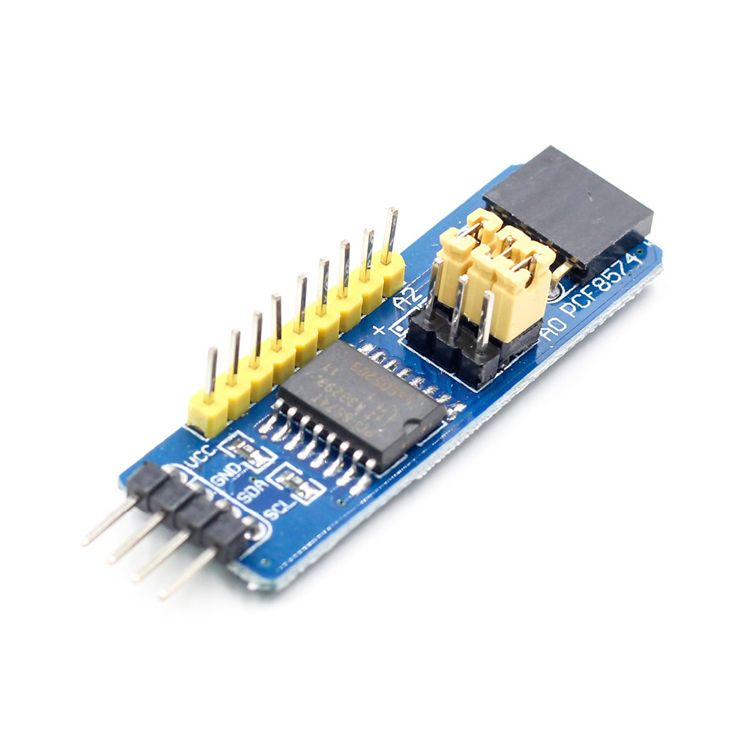PCF8574 driver to set pin mode, read and write digital signal 3.3v
Project description
Python driver for PCF8574 8bit IO Expander board
Developed for the Raspberry Pi, requires python-smbus2 package to access the I2C bus.
Tested on raspberry pi 3b plus with two PCF8574 boards.
First install smbus2 using:
pip3 install smbus2
then install the actual package using:
pip3 install pcf8574-io
Usage Example:
import pcf8574_io
# You can use up to 8 PCF8574 boards
# the board will start in input mode
# the pins are HIGH in input mode
p1 = pcf8574_io.PCF(0x20)
# You can use multiple boards with different addresses
#p2 = pcf8574_io.PCF(0x21)
# p0 to p7 are the pins name
# INPUT or OUTPUT is the mode
p1.pin_mode("p0", "INPUT")
print(p1.read("p0"))
# You can write and read the output pins
# use HIGH or LOW to set the pin, HIGH is +3.3v LOW is 0v
p1.pin_mode("p7", "OUTPUT")
p1.write("p7", "LOW")
print(p1.read("p7"))
# Additional you can do the following
p1.set_i2cBus(1)
p1.get_i2cBus()
print(p1.get_pin_mode("p7")) # returns string OUTPUT, INPUT
print(p1.is_pin_output("p7")) # returns boolean True, False
print(p1.get_all_mode()) # returns list of all pins ["OUTPUT","INPUT",...etc]
Note: the board has only 25mA output current so if you want to control some relay modules, that need more than 25mA use more than one pin to control each relay.
The board been used:
Project details
Download files
Download the file for your platform. If you're not sure which to choose, learn more about installing packages.
Source Distribution
Built Distribution
Filter files by name, interpreter, ABI, and platform.
If you're not sure about the file name format, learn more about wheel file names.
Copy a direct link to the current filters
File details
Details for the file pcf8574_io-0.1.1.tar.gz.
File metadata
- Download URL: pcf8574_io-0.1.1.tar.gz
- Upload date:
- Size: 3.7 kB
- Tags: Source
- Uploaded using Trusted Publishing? No
- Uploaded via: twine/3.4.1 importlib_metadata/4.5.0 pkginfo/1.6.1 requests/2.24.0 requests-toolbelt/0.9.1 tqdm/4.51.0 CPython/3.7.7
File hashes
| Algorithm | Hash digest | |
|---|---|---|
| SHA256 |
cc6f88b2deaa589a28a3748b6b2ca4212d0707d67685f9a0ed4221037e9c9fe9
|
|
| MD5 |
d1f5afe039a4696f2147d113d4064b49
|
|
| BLAKE2b-256 |
35267a0b7fd47a46b03cfc9d419bf7be8d50dcf7b0f2f46a0d0231826d63c4b4
|
File details
Details for the file pcf8574_io-0.1.1-py3-none-any.whl.
File metadata
- Download URL: pcf8574_io-0.1.1-py3-none-any.whl
- Upload date:
- Size: 4.2 kB
- Tags: Python 3
- Uploaded using Trusted Publishing? No
- Uploaded via: twine/3.4.1 importlib_metadata/4.5.0 pkginfo/1.6.1 requests/2.24.0 requests-toolbelt/0.9.1 tqdm/4.51.0 CPython/3.7.7
File hashes
| Algorithm | Hash digest | |
|---|---|---|
| SHA256 |
117126d8671fad811259d2d53211c8e2bae612254996e8acc7c8ffae5d040311
|
|
| MD5 |
2b2f7ea85d688a2cbdd352ada7c9e141
|
|
| BLAKE2b-256 |
ee1158b2c5d2ba38aa713c4294dc62aaab7795fa6eb7f1b45f29c8a5201ea357
|












